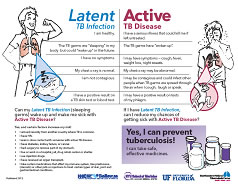Investigation Updates
July 24, 2018
DHEC has confirmed a case of tuberculosis (TB) in someone associated with the West Ashley High School in Charleston County. DHEC is working closely with school leaders to identify members of the school community who may have been exposed and need TB testing. This process is called a "TB contact investigation." DHEC has communicated this information to parents and staff and will continue to keep the school community updated on next steps. DHEC has evaluated the school layout and routine activities of the case to determine the level of risk for classrooms, lunchrooms and other areas where the students and staff congregate.
A TB contact investigation is a fluid process that is completed based on CDC (Centers for Disease Control and Prevention) guidance. Information gathered during the investigation is used to make specific testing recommendations to individuals. As the contact investigation progresses, additional people may be recommended for testing.
It is important to note that TB can be treated with antibiotics. DHEC will update this web page throughout the investigation as information becomes available.
Facts about TB
What is TB?
Tuberculosis (TB) is a bacterial disease found primarily in the lungs. It is spread from person to person through the air. Individuals who have tuberculosis in their lungs cough the bacteria into the air and others become infected by breathing in the bacteria. These individuals now have latent TB infection. Without treatment for latent TB infection, approximately 10 percent of the individuals who become infected will develop tuberculosis disease sometime in their lifetime. The remaining 90 percent of the individuals with latent TB carry the bacteria for a lifetime without developing the disease.
- Tuberculosis information from DHEC
- Tuberculosis from CDC
- TB Infection vs TB Disease (click image to view PDF)
Is there a treatment for TB?
Yes, TB is treatable using a prescribed course of antibiotics. TB disease can be treated by taking several medications for 6 to 12 months. It is very important that people who have TB disease finish the medicine, and take them exactly as prescribed. If the medications are stopped too soon or not taken as directed, TB germs that are still alive may cause illness or become resistant to the medications.
FAQs about this Investigation
What is DHEC's role in the investigation?
During a potential TB exposure, DHEC will complete a contact investigation to identify everyone who may have been exposed. DHEC TB staff will evaluate exposed individuals for signs of illness, and provide treatment if indicated for individuals that are infected with TB and at risk of developing disease.
How does the contact investigation work?
During a contact investigation, trained public health staff determines which individuals have been exposed by visiting all the environments where the person with TB has been, and evaluates each site to determine how the air was circulated and how long they spent in each place.
Who is at risk?
Individuals who have been around the person with TB disease for an extended period of time are at risk of being infected with the TB germ. Our TB staff have identified those individuals, and they have been notified of their possible exposure and need for testing. If you have not been advised to undergo testing, we do not believe you to be at risk of exposure at this time.
TB Statistics
How many TB cases do we typically see each year (SC/US)?
In South Carolina we had 102 cases of active TB in 2016 and 101 in 2017. In the United States, there were 9,287 cases in 2016 and 9,093 cases in 2017.
